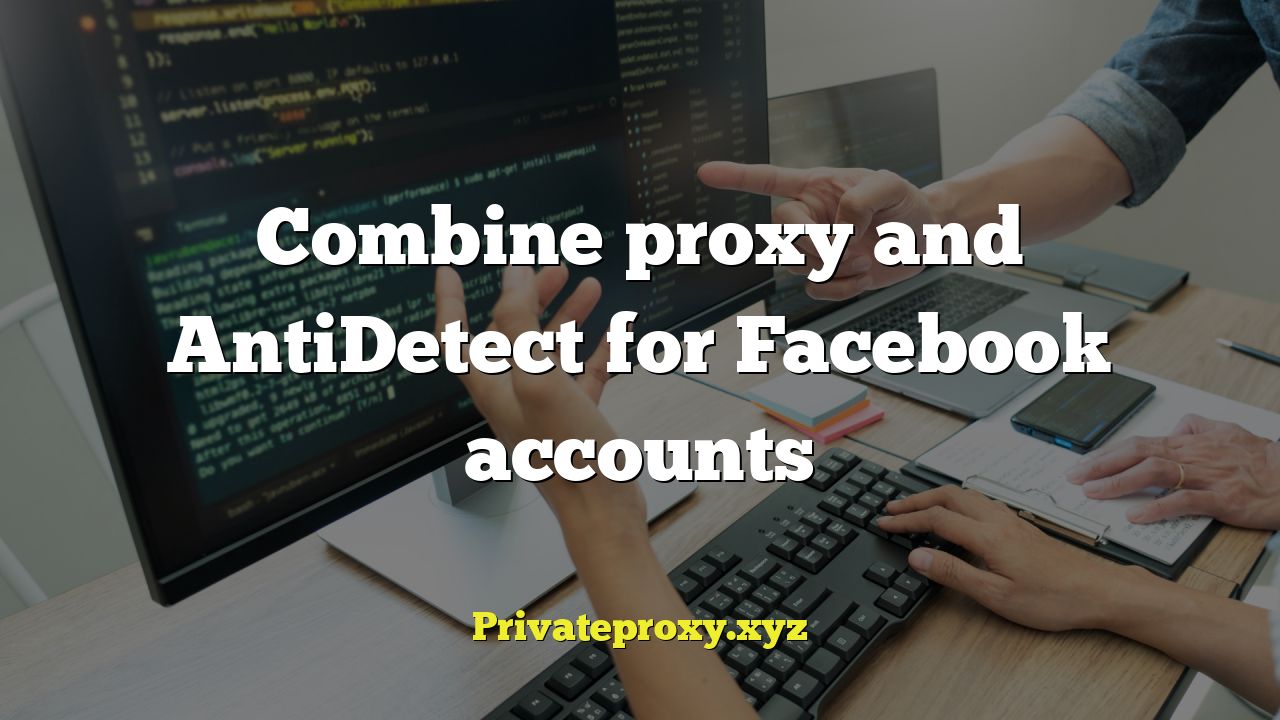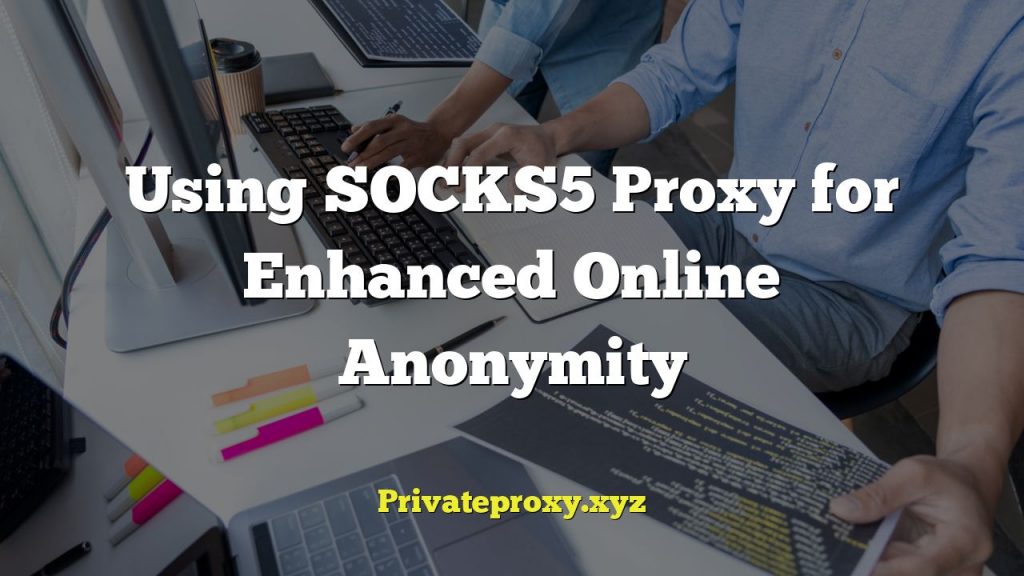
Introduction: Securing Your Facebook Accounts
Managing multiple Facebook accounts, whether for marketing, research, or personal reasons, often requires sophisticated techniques to avoid detection and bans. Simply creating numerous accounts from the same IP address or using identical browser fingerprints raises immediate red flags to Facebook’s security algorithms. This is where combining proxies and AntiDetect browsers becomes crucial. Proxies mask your IP address, while AntiDetect browsers create unique digital fingerprints for each account, making them appear as distinct users to Facebook. This article delves into the details of effectively combining these two tools to enhance the security and longevity of your Facebook accounts.
Understanding Proxies: Your Digital Mask
A proxy server acts as an intermediary between your computer and the internet. When you connect to a website through a proxy, the website sees the proxy server’s IP address instead of your own. This is fundamental for managing multiple Facebook accounts, as it prevents Facebook from easily associating them based on a shared IP address.
Types of Proxies
Not all proxies are created equal. Choosing the right type is critical for Facebook account security.
- Shared Proxies: These are the cheapest option, but also the least reliable. Many users share the same IP address, increasing the risk of detection and bans.
- Dedicated Proxies: You have exclusive use of a single IP address. This offers better performance and lower risk of detection than shared proxies.
- Residential Proxies: These proxies use IP addresses assigned to real residential internet service providers. They appear as legitimate users, making them the most difficult to detect.
- Mobile Proxies: Similar to residential proxies, these use IP addresses assigned to mobile carriers. Often considered the most trusted type of proxy due to the nature of mobile IP assignment.
For Facebook account management, dedicated, residential, or mobile proxies are generally recommended. Shared proxies are often too risky due to the high likelihood of being flagged or blacklisted.
AntiDetect Browsers: Forging Unique Digital Fingerprints
While proxies mask your IP address, Facebook also uses browser fingerprinting to identify and track users. A browser fingerprint is a unique combination of various browser and system settings, such as user agent, screen resolution, installed fonts, operating system, and more. Even if you use a proxy, a consistent browser fingerprint across multiple accounts can still link them together.
AntiDetect browsers solve this problem by allowing you to create unique browser profiles, each with its own independent fingerprint. Each profile appears to Facebook as a completely separate user on a completely separate device.
Key Features of AntiDetect Browsers
- Customizable Browser Profiles: You can configure various aspects of the browser profile, including user agent, operating system, screen resolution, WebGL settings, and more.
- Cookie Management: Each profile has its own separate cookie storage, preventing cross-account tracking.
- Canvas Spoofing: Prevents websites from accurately fingerprinting your browser using Canvas API.
- WebRTC Leak Protection: Prevents your real IP address from being leaked through WebRTC.
Combining Proxies and AntiDetect Browsers: A Synergistic Approach
The real power comes from combining proxies and AntiDetect browsers. Here’s how the synergy works:
- Create a Unique Profile: In your AntiDetect browser, create a new profile for each Facebook account.
- Configure the Proxy: Within the profile settings, configure the proxy server you want to use for that specific account. Ensure the proxy is functioning correctly and shows the correct IP address.
- Customize the Fingerprint: Customize the browser fingerprint settings to make each profile unique. Vary user agents, screen resolutions, operating systems, fonts, and other parameters.
- Isolate Cookies and Cache: Ensure that cookies and cache are completely isolated for each profile. This prevents cross-account tracking based on stored data.
By following these steps, you create a situation where each Facebook account appears to originate from a distinct user, using a unique device, and connecting from a different IP address. This significantly reduces the risk of account detection and bans.
Choosing the Right Tools: Proxy and AntiDetect Browser Selection
Selecting the right proxies and AntiDetect browser is crucial for success. Consider these factors:
Proxy Considerations:
- Reliability: Choose a proxy provider with a reputation for uptime and stability. Downtime can interrupt your workflow and expose your real IP address.
- Speed: Slow proxies can negatively impact your browsing experience and potentially raise suspicion.
- Geolocation: Select proxies from locations that align with your target audience or business needs.
- Rotation: Some proxy providers offer rotating proxies, which automatically change the IP address at regular intervals. This can further enhance security.
- Pricing: Balance cost with quality and reliability. Cheaper options may not be as reliable or secure.
AntiDetect Browser Considerations:
- Customization Options: Choose an AntiDetect browser that offers a wide range of customization options for browser fingerprinting.
- Usability: The browser should be user-friendly and easy to navigate.
- Stability: Select a browser that is stable and doesn’t crash frequently.
- Support: Ensure the browser provider offers good customer support in case you encounter issues.
- Pricing: AntiDetect browsers typically come with a subscription fee. Compare pricing plans and features to find the best value for your needs.
Best Practices for Managing Facebook Accounts
Even with proxies and AntiDetect browsers, it’s important to follow best practices for managing Facebook accounts to minimize the risk of detection and bans.
Account Warm-Up
Don’t immediately start engaging in high-volume activity with a new account. “Warm-up” the account by gradually increasing activity over a period of days or weeks. This makes the account appear more organic and less likely to be flagged.
Realistic Activity
Mimic human behavior. Don’t automate all your actions. Engage in a variety of activities, such as liking posts, joining groups, commenting, and sharing content. Avoid repetitive actions that could trigger Facebook’s spam filters.
Content Variety
Post a diverse range of content, including text, images, and videos. Avoid posting the same content across multiple accounts, as this is a common red flag.
Avoid Over-Automation
While automation tools can be helpful, excessive automation can lead to detection. Use automation sparingly and ensure it mimics human behavior as closely as possible.
Monitor Account Health
Regularly check your accounts for any warnings or restrictions from Facebook. Address any issues promptly to prevent further problems.
Advanced Techniques: Rotating Proxies and User Agent Management
For even greater security, consider incorporating advanced techniques such as rotating proxies and sophisticated user agent management.
Rotating Proxies
Rotating proxies automatically change the IP address used by your account at regular intervals. This makes it even more difficult for Facebook to track your activity over time. Some AntiDetect browsers have built-in support for rotating proxies, while others require external software.
Advanced User Agent Management
Instead of simply choosing a random user agent, consider using a more sophisticated approach. Research popular browsers and operating systems used by your target audience and select user agents that are representative of those users. This can make your accounts appear more realistic and less likely to be detected.
Troubleshooting Common Issues
Even with the best tools and practices, you may still encounter issues. Here are some common problems and how to troubleshoot them.
Proxy Connection Issues
If you’re unable to connect to the internet through your proxy, check the following:
- Proxy Settings: Verify that your proxy settings are entered correctly in your AntiDetect browser.
- Proxy Authentication: If your proxy requires authentication, make sure you’ve entered the correct username and password.
- Proxy Status: Check the status of your proxy server. It may be down or experiencing connectivity issues.
Account Bans
If your account gets banned, try the following:
- Investigate the Cause: Try to determine why the account was banned. Did you violate Facebook’s terms of service? Were you engaging in suspicious activity?
- Appeal the Ban: If you believe the ban was unwarranted, you can appeal it to Facebook.
- Create a New Account: If the ban is permanent, you’ll need to create a new account. Be sure to use a different proxy and browser fingerprint this time.
Conclusion: A Layered Approach to Facebook Account Security
Managing multiple Facebook accounts safely and effectively requires a layered approach. Combining proxies and AntiDetect browsers provides a strong foundation, but it’s also essential to follow best practices for account management, monitor account health, and stay up-to-date on Facebook’s latest security measures. By taking a proactive and comprehensive approach, you can significantly reduce the risk of detection and bans and ensure the longevity of your Facebook accounts.


